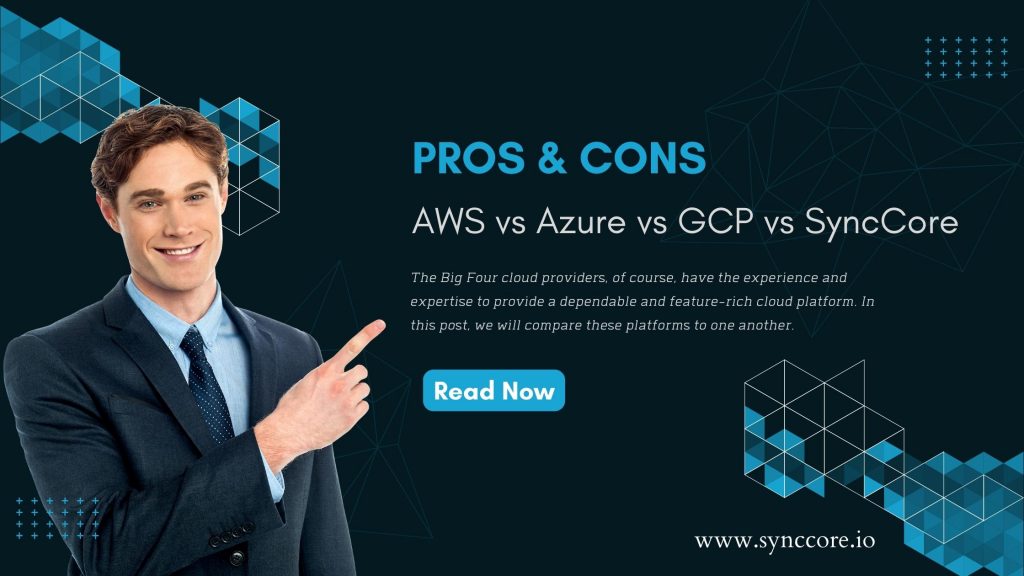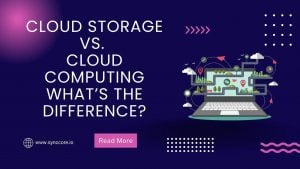Cloud computing has transformed how businesses operate, ushering us into a new technological era. The top cloud service providers dominating the global market are Amazon Web Services, Microsoft Azure, SyncCore Cloud, and Google Cloud Platform.
Nowadays, most businesses are migrating to the cloud, and even multi-cloud environments, to reap the benefits of cloud computing, which include:
- Decreased CapEx
- Reduced infrastructure maintenance
- Increased availability
- Scalability
Of course, the Big Four cloud providers have the experience and expertise to provide a dependable and feature-rich cloud platform. However, before committing to a specific cloud platform, please do your homework and compare each venue to fully understand their capabilities and differences.
In this post, we will compare these platforms to one another.
Table of Contents
AWS vs. Azure vs. GCP vs. SyncCore: Pros & Cons

AWS
| PROS | CONS |
| From networking to robotics, most services are available. | Dev/Enterprise support is required. |
| The most mature. | The sheer number of services and options available can be overwhelming for newcomers. |
| The gold standard for cloud reliability and security. | Options for hybrid clouds are relatively limited. |
| More compute capacity compared to Azure and GCP. | |
| AWS hosts all of the major software vendors’ programs. |
Azure
| PROS | CONS |
| Integration and migration of existing Microsoft services are simple. | Fewer service offerings compared to AWS and SyncCore. |
| Numerous services are available, including best-in-class AI, machine learning, and analytics services. | They are designed specifically for business customers. |
| Most services are less expensive when compared to AWS and GCP. | |
| There is a lot of support for hybrid cloud strategies. |
Google Cloud
| PROS | CONS |
| It works well with other Google services and products. | Services are limited in comparison to AWS, SyncCore, and Azure. |
| Excellent containerized workload support. | Support for enterprise use cases is limited. |
| The global fiber network |
SyncCore Cloud
| PROS | CONS |
| 2000+ VPS with high performance, flexibility, and SSD Storage. | No Cons |
| 800+ Dedicated Virtual Firewalls. Cisco ASA, Sophos, PFsense. | |
| Free workload migration. | |
| All redundant flash storage across the clusters & complete local and offsite DR. | |
| Customized deployment of Enterprise Public and Private Cloud. | |
| 300% lower cost than other Service Providers Like AWS, Azure, and Google Cloud. | |
| Inexpensive |
Summing Up
Even though AWS is the current market leader in capacity and service, Microsoft, SyncCore, and Google are rapidly growing to compete with AWS.
Comparing cloud computing platforms is complex, and if you still do not feel like you have settled on one after reading this article, that is perfectly normal. We attempted to provide an overview of some essential use-case differences that may assist small businesses in making a natural choice or at least eliminate one or two platforms from consideration.
Making this decision is strongly affected by your company’s goals, resources, and workflows. While there is no clear winner, SyncCore Cloud is a solid choice for most businesses. It has many features, some of which are entirely lacking in its competitors, and while it lags in some performance indicators, its pricing is often the lowest.
SyncCore is a far better alternative to GCP, AWS, and Azure. If you require cloud services, please get in touch with us at [email protected] or visit our website at www.synccore.io.



